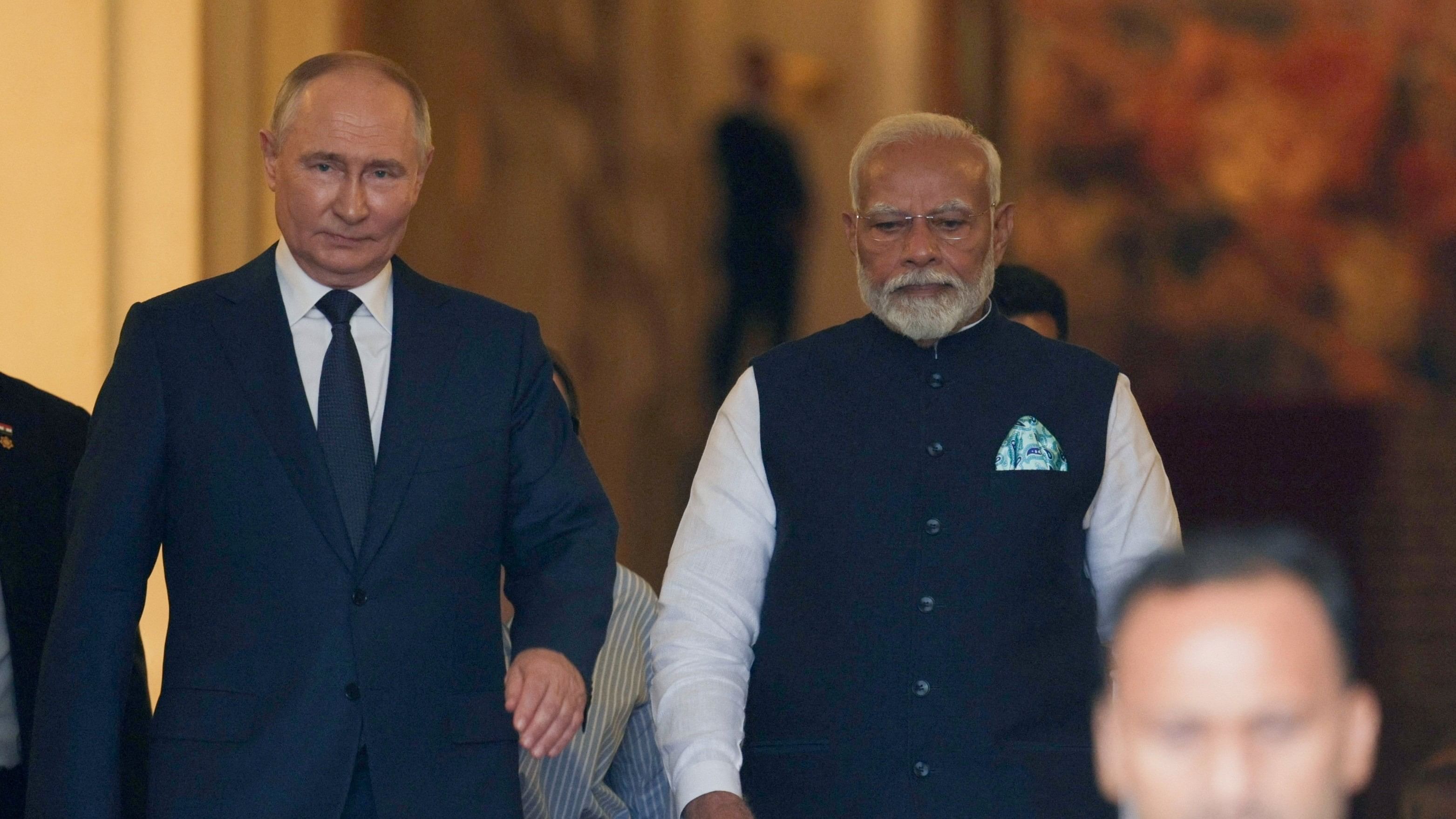
Russian President Vladimir Putin bids farewell to Prime Minister Narendra Modi following their meeting at the Kremlin in Moscow, Russia. July 9, 2024.
Credit: Sputnik/Gavriil Grigorov/Pool via REUTERS
New Delhi: With the Russia-Ukraine conflict restricting the former Soviet Union nation’s capacity to meet the demands of spare parts for military hardware it supplies to India, Moscow has agreed with New Delhi to set up more joint production facilities in the South Asian nation to avert delays in supply.
The two nations have also set a target for raising the annual bilateral trade from $65.70 billion in 2023-24 to $100 billion over the next six years – notwithstanding the looming threat of sanctions imposed by the United States and the rest of the West on Russia in the wake of the former Soviet Union nation’s 'special military operations' in Ukraine and the anxiety over its implications for India.
As Prime Minister Narendra Modi and Russian President Vladimir Putin met in Moscow, the two sides agreed on developing a bilateral settlement system using national currencies as well as on the consistent introduction of digital financial instruments into mutual settlements. The move is intended to avoid difficulties in payment due to the sanctions imposed on Russia by the US.
Russia agreed to increase cargo turnover with India through the launch of new routes of the North-South International Transport Corridor, the Northern Sea Route, and the Chennai-Vladivostok Sea Line.
Modi conveyed to Putin that India would set up new consulates in Russia, one in Kazan and the other one is Yekaterinburg.
The two sides inked nine pacts after the Modi-Putin meeting, including one between Invest India and JSC "Management Company of Russian Direct Investment Fund” and another on cooperation in trade, economic, and investment spheres in the Russian Far East for the period from 2024 to 2029 as well as of cooperation principles in the Arctic zone of the Russian Federation.
Modi raised the issue of delays in the supply of military spare parts from Russia to India during his talks with Putin.
"Both sides had a general sense of agreement that this (supply of spare parts for military hardware India received from Russia over the years) would be expedited including through setting up joint venture partnerships in India to look at some of these spare parts, particularly the more critical ones so that we can address the challenge in a meaningful way", Foreign Secretary Vinay Mohan Kwatra told journalists in Moscow after the two leaders had the annual summit after a gap of two years.
“We already have some good examples of co-production in the field of defence and we would very much like to build on that and add on new equipment if needed as part of co-production", he said.
The joint statement issued after the Modi-Putin meeting noted that both sides had agreed to "encourage joint manufacturing in India of spare parts, components, aggregates, and other products for the maintenance of Russian-origin arms and defence equipment under Make-in-India programme through the transfer of technology (from Russia)”. The two sides agreed to set up joint ventures to meet the needs of the armed forces of India as well as subsequent export to friendly third countries with approvals from both.
The two sides confirmed their intention to broaden cooperation in nuclear power including fuel cycle, life cycle support for operating the Kudankulam Nuclear Power Programme, and non-power applications. Both Sides noted the importance of further discussion on the second site in India in accordance with earlier signed agreements.
The sides agreed to continue technical discussions on the VVER 1200 of the Russian design, localization of equipment, and joint manufacturing of NPP (nuclear power plant) components as well as on cooperation in third countries.
